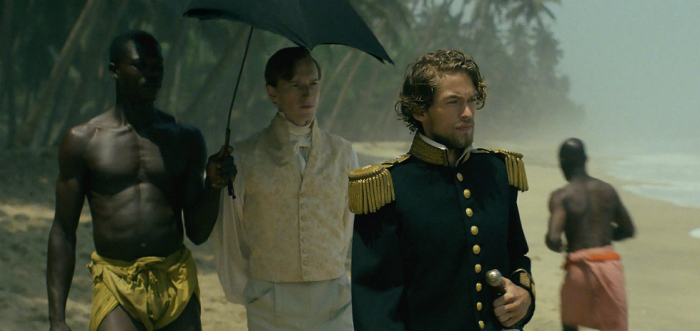
Daniel Dencik is a Danish writer and filmmaker with several novels, essays, and documentary features under his belt. He’s known for tackling a smorgasboard of topics, from psychology to professional cycling, but when it comes to his drama debut, Gold Coast, he’s settled on perhaps the thorniest one possible: the West African slave trade of the 19th century, as seen through the starry eyes of a Danish white ‘educator’ (Jakob Oftebro). While he and his crew tackle a very real moment in history laden with ruin and regret, it has none of the dryness you may have expected from his factual pedigree—few historical texts, I imagine, start with a scene of a white slaver being pissed on by two of his own kind as black prisoners cower naked in the corner, nor would they proceed to catapult us into his headspace, fraught for most of his journey with one form of misplaced confidence or another. Although we rewind the timeline from here, with sun-kissed bed tousles with his wife (Luise Skov) being a brief respite before the trip into darkness, the in media res flourish is an all-important disclosure that a wide-awake nightmare of conscience is coming.
Much of the opening act is spent in awe and pleasure—Wulff can scarcely contain his wonder as native Guineans come cartwheeling to meet him at his disembarkation onto the beach. He then enjoys the company of his colonialist peers (Anders Heinrichsen, Adam Ild Rohweder) and recounts wistful observances in narration, framed as letters home to his beloved. At all of these moments, Dencik, Oftebro and cinematographer Martin Munch never fail to impart the attraction of this self-fulfilment, nor, crucially, to do so without filling the background with the scores of human property that shoulder it. Peeling away this malaise of privilege is a slow but engrossing process, and it goes hand in hand with the unforgiving jungle outside, which is seemingly a perpetual presence in the sound mix. Try as Wulff and an evangelical couple (Danica Curcic, Mikkel Hilgart) might to thrust Danish observance upon their slaves, its natural parasites invade their bodies, and their deep moral guilt and naivete grows bigger in sync with their cohorts’ animalistic abuse of wine and women. The bubbling-over, paced excellently with editors Rebekka Lønqvist and Theis Schmidt, is as ambiguous as it is inevitable.
Aiding this is, surprisingly, a synth score by David Lynch luminary Angelo Badalamenti. It’d be too easy to shrug to cry “anachronism” here and call it a day; a common response to a conceit also found in the likes of Marie Antoinette or The Great Gatsby. The argument is that it yanks a viewer out of the “experience”, disrupting that comfortably familiar sensation of being immersed in the world onscreen. This is a typical prescription that Dencik has no track with. To honour a period setting in all of the mise en scene is to keep it comfortably cordoned off from modern day, and in this case, pretending we’ve wholly separated ourselves from the mentality and fallout of white colonialism is yet more dangerously insular thinking. What’s more, Badalamenti’s compositions are gorgeous, creating currents of menace and artificiality that dimensionalises the sheer spectacle of the Ghanian locales. And with all that said, there is era-appropriate music as well, but it only appears against images of cigar smoke and liquor swilling; “beauty”, as determined by the ruling class, fed to us through a filter of chemical delirium. Hence, the choice to place a non-diegetic piano melody over Wulff, precisely when he’s at his most far gone, is Badalamenti’s most evocative and telling gesture.
For all the cold, surreal wonder in Gold Coast, there’s not a shred of doubt that the terrors are the terrors, and it doesn’t arrive at the expense of oversimplified slave or captor. The most affronting horror of all is when we realise that the dependency cuts both ways. The same entitlement that coaxed Wulff across the sea is now feeding him the delusion that he can break their shackles by will alone, when in fact the damage his people have wrought is irreversible. In a film replete with indelible images, the most of these is the panic erupting in Oftebro’s eyes when he asks whether they’ll remember how to irrigate their gardens, and they utter Pavlovian yeses in response; a chilling reveal of humanity, both relatable and deplorable. With wordless moments like this, the already omnipresent black cast speak volumes in mere stares, with Wulff’s attending boy Lumpa (John Aggrey) being especially affecting. Our ‘hero’, meanwhile, furiously inspects his own morality at every step and butts up against conclusions that are understandable, albeit galling. Even Wulff’s leery allies have their impulses tempered with the aspirations of the time: military customs rule their lives, and their unnamed Guvernør (Morten Holst) faces death in his 40s. Such relaxed depth of characterisation is totally fitting of a writer-director with a literary bent, but the confident craft on display make this the work of an instantly seasoned film-maker.
